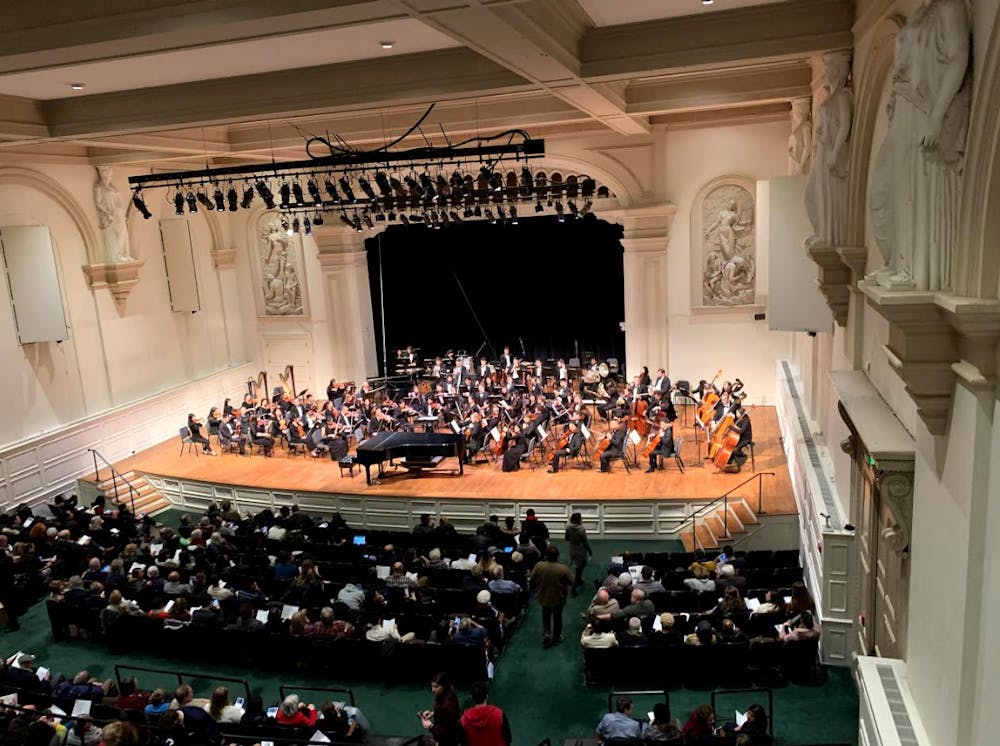Having always been dragged to classical music performances by my parents when I was young, my lingering impression of the music was that it was boring and too long. My attempts as a musician fell short as well; I used to play the piano, cello and guitar, but I haven’t touched any of those instruments in years.
Hoping to rediscover some culture for a change, I decided to attend a Peabody Symphony Orchestra performance at the Peabody Institute’s Miriam A. Friedberg Concert Hall on Friday, Nov. 7. Fun fact: It’s actually one of America’s oldest recital halls.
The evening started off with a heartfelt opening statement from the Dean of the Peabody Institute, Fred Bronstein.
“Tonight, we celebrate the legacy of Steven Muller [a previous University president] who was responsible for many important things, including the creation of an affiliation between Peabody and Johns Hopkins,” he said.
He continued to commemorate the former Hopkins president for having “saved Peabody” and bringing a “new asset” to Hopkins. According to the pamphlet handed out at the venue, the arrangement brought “much needed management and development capabilities to the financially struggling Conservatory and significantly expanded the University’s commitment to the humanities.” After the affiliation in 1977, Peabody Institute later became a full division of Johns Hopkins in 1986.
The first piece in the performance was composed by Béla Bartók, a renowned Hungarian composer, who is known for the difficulty of his pieces.
With the orchestra patiently waiting for its cue, pianist Chengcheng Yao entered in a stunning red dress that cutely matched the conductor’s sleeve. Yao is a soloist pursuing her Doctor of Musical Arts degree at the Peabody Institute and has an impressive resume of awards and accomplishments: She is the recipient of the Elizabeth Parisot Prize at Yale University, where she earned a master’s degree and she also has a master’s from Juilliard. After tuning all of their instruments, a moment of silence was followed by a vigorous and powerful start of the piece.
It seemed like a conversation between the piano, the percussion and the wind instruments. The gradual entrance of eerie and mystic strings that followed the playful back and forth slowed down the piece’s pace.
Soft and slow, yet powerful and mesmerizing sounds then filled the air; and, I had to double check that they were sounds coming strictly from the instruments. What immediately came to mind was the scene in Snow White where the princess navigates her way through the dark forest and runs away from creatures whose eyes are the only things visible in the darkness.
The piano then came in again, bringing up the tempo. The orchestra provided a strong base for the piano, but it shone on its own; and, while I’m no expert, I can confidently say that the piano was absolutely perfect.
In an interview with The News-Letter, audience member Joon-Young Moon, a research scientist in the Brain and Psychological Sciences Department at Hopkins, shared that he enjoyed the performances and compared it to classical music performances he had heard in Michigan, where he previously lived.
“I previously worked at the University of Michigan and attended many orchestra performances there,” he said. “But honestly, I think I like the Peabody Orchestra more.”
Moon is a personal fan of conductor Marin Alsop, who is also the conductor of the Baltimore Symphony Orchestra.
The concert came to an end with the second and final piece, Dmitri Shostakovich’s Symphony No. 5 in D minor, phenomenally adapted by the Symphony Orchestra.
It was clear from the cacophony of coughs that followed the end of each movement that people from the performance so captivating they couldn’t bring themselves to make any noise at all.
I thoroughly enjoyed every second of the performance and I’m honestly sad I didn’t start going to such performances on my own until now. I’m someone who gets bored very easily, but I was entranced by the whole program. You can be sure to spot me at every classical music performance in Baltimore this semester.





